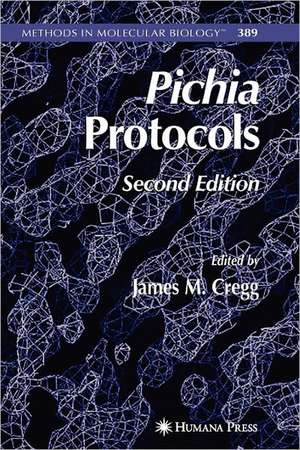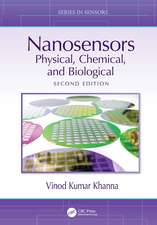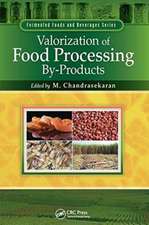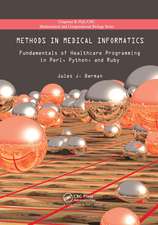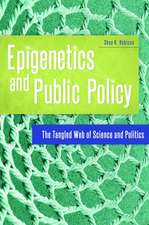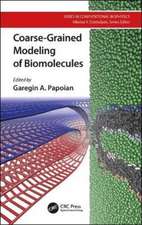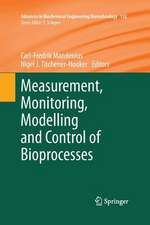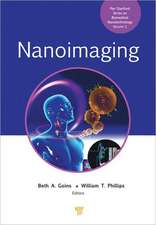Pichia Protocols: Methods in Molecular Biology, cartea 389
Editat de James M. Creggen Limba Engleză Paperback – 19 noi 2010
This volume fully updates and expands upon the first edition of Pichia Protocols, and focuses primarily on information that has come to light since its original publication. Each chapter presents cutting-edge and cornerstone protocols for utilizing P. pastoris as a model recomibinant protein production system.
| Toate formatele și edițiile | Preț | Express |
|---|---|---|
| Paperback (1) | 640.37 lei 6-8 săpt. | |
| Humana Press Inc. – 19 noi 2010 | 640.37 lei 6-8 săpt. | |
| Hardback (1) | 644.95 lei 6-8 săpt. | |
| Humana Press Inc. – 8 aug 2007 | 644.95 lei 6-8 săpt. |
Din seria Methods in Molecular Biology
- 9%
 Preț: 791.59 lei
Preț: 791.59 lei - 23%
 Preț: 598.56 lei
Preț: 598.56 lei - 20%
 Preț: 882.95 lei
Preț: 882.95 lei -
 Preț: 252.04 lei
Preț: 252.04 lei - 5%
 Preț: 802.69 lei
Preț: 802.69 lei - 5%
 Preț: 729.61 lei
Preț: 729.61 lei - 5%
 Preț: 731.43 lei
Preț: 731.43 lei - 5%
 Preț: 741.30 lei
Preț: 741.30 lei - 5%
 Preț: 747.16 lei
Preț: 747.16 lei - 15%
 Preț: 663.45 lei
Preț: 663.45 lei - 18%
 Preț: 1025.34 lei
Preț: 1025.34 lei - 5%
 Preț: 734.57 lei
Preț: 734.57 lei - 18%
 Preț: 914.20 lei
Preț: 914.20 lei - 15%
 Preț: 664.61 lei
Preț: 664.61 lei - 15%
 Preț: 654.12 lei
Preț: 654.12 lei - 18%
 Preț: 1414.74 lei
Preț: 1414.74 lei - 5%
 Preț: 742.60 lei
Preț: 742.60 lei - 20%
 Preț: 821.63 lei
Preț: 821.63 lei - 18%
 Preț: 972.30 lei
Preț: 972.30 lei - 15%
 Preț: 660.49 lei
Preț: 660.49 lei - 5%
 Preț: 738.41 lei
Preț: 738.41 lei - 18%
 Preț: 984.92 lei
Preț: 984.92 lei - 5%
 Preț: 733.29 lei
Preț: 733.29 lei -
 Preț: 392.58 lei
Preț: 392.58 lei - 5%
 Preț: 746.26 lei
Preț: 746.26 lei - 18%
 Preț: 962.66 lei
Preț: 962.66 lei - 23%
 Preț: 860.21 lei
Preț: 860.21 lei - 15%
 Preț: 652.64 lei
Preț: 652.64 lei - 5%
 Preț: 1055.50 lei
Preț: 1055.50 lei - 23%
 Preț: 883.85 lei
Preț: 883.85 lei - 19%
 Preț: 491.88 lei
Preț: 491.88 lei - 5%
 Preț: 1038.84 lei
Preț: 1038.84 lei - 5%
 Preț: 524.15 lei
Preț: 524.15 lei - 18%
 Preț: 2122.34 lei
Preț: 2122.34 lei - 5%
 Preț: 1299.23 lei
Preț: 1299.23 lei - 5%
 Preț: 1339.10 lei
Preț: 1339.10 lei - 18%
 Preț: 1390.26 lei
Preț: 1390.26 lei - 18%
 Preț: 1395.63 lei
Preț: 1395.63 lei - 18%
 Preț: 1129.65 lei
Preț: 1129.65 lei - 18%
 Preț: 1408.26 lei
Preț: 1408.26 lei - 18%
 Preț: 1124.92 lei
Preț: 1124.92 lei - 18%
 Preț: 966.27 lei
Preț: 966.27 lei - 5%
 Preț: 1299.99 lei
Preț: 1299.99 lei - 5%
 Preț: 1108.51 lei
Preț: 1108.51 lei - 5%
 Preț: 983.72 lei
Preț: 983.72 lei - 5%
 Preț: 728.16 lei
Preț: 728.16 lei - 18%
 Preț: 1118.62 lei
Preț: 1118.62 lei - 18%
 Preț: 955.25 lei
Preț: 955.25 lei - 5%
 Preț: 1035.60 lei
Preț: 1035.60 lei - 18%
 Preț: 1400.35 lei
Preț: 1400.35 lei
Preț: 640.37 lei
Preț vechi: 753.39 lei
-15% Nou
Puncte Express: 961
Preț estimativ în valută:
122.53€ • 128.28$ • 101.39£
122.53€ • 128.28$ • 101.39£
Carte tipărită la comandă
Livrare economică 05-19 aprilie
Preluare comenzi: 021 569.72.76
Specificații
ISBN-13: 9781617375637
ISBN-10: 1617375632
Pagini: 268
Ilustrații: XII, 268 p.
Dimensiuni: 152 x 229 x 16 mm
Greutate: 0.42 kg
Ediția:Softcover reprint of hardcover 2nd ed. 2007
Editura: Humana Press Inc.
Colecția Humana
Seria Methods in Molecular Biology
Locul publicării:Totowa, NJ, United States
ISBN-10: 1617375632
Pagini: 268
Ilustrații: XII, 268 p.
Dimensiuni: 152 x 229 x 16 mm
Greutate: 0.42 kg
Ediția:Softcover reprint of hardcover 2nd ed. 2007
Editura: Humana Press Inc.
Colecția Humana
Seria Methods in Molecular Biology
Locul publicării:Totowa, NJ, United States
Public țintă
ResearchCuprins
Vectors and Strains for Expression.- DNA-Mediated Transformation.- Rational Design and Optimization of Fed-Batch and Continuous Fermentations.- Saturation of the Secretory Pathway by Overexpression of a Hookworm (Necator americanus) Protein (Na-ASP1).- Purification of the N- and C-Terminal Subdomains of Recombinant Heavy Chain Fragment C of Botulinum Neurotoxin Serotype C.- Rapid Screening of Chromatography Resins for the Purification of Proteins.- Characterization of O-Linked Saccharides on Glycoproteins.- Modification of the N-Glycosylation Pathway to Produce Homogeneous, Human-Like Glycans Using GlycoSwitch Plasmids.- N-Linked Glycan Characterization of Heterologous Proteins.- Heavy Labeling of Recombinant Proteins.- Selenomethionine Labeling of Recombinant Proteins.- Selective Isotopic Labeling of Recombinant Proteins Using Amino Acid Auxotroph Strains.- Classical Genetics.- Identification of Pexophagy Genes by Restriction Enzyme-Mediated Integration.- Characterization of Protein-Protein Interactions.- Localization of Proteins and Organelles Using Fluorescence Microscopy.- Fluorescence Microscopy and Thin-Section Electron Microscopy.
Recenzii
From the reviews of the second edition:
"P. pastoris has many superior traits. … can grow to very high cell densities prior to switching on an inducible promoter (the AOX1 gene) for maximal recombinant protein production. The diversity of such proteins produced by expression strains of P. pastoris is quite amazing and this book describes detailed experimental protocols for a few of them (e.g. hookworm protein, botulinum toxin). … This is a stand-alone book … . a book that will prove valuable to yeast molecular geneticists and biotechnologists." (Graeme Walker, Microbiology Today, May, 2008)
"P. pastoris has many superior traits. … can grow to very high cell densities prior to switching on an inducible promoter (the AOX1 gene) for maximal recombinant protein production. The diversity of such proteins produced by expression strains of P. pastoris is quite amazing and this book describes detailed experimental protocols for a few of them (e.g. hookworm protein, botulinum toxin). … This is a stand-alone book … . a book that will prove valuable to yeast molecular geneticists and biotechnologists." (Graeme Walker, Microbiology Today, May, 2008)
Textul de pe ultima copertă
The use of Pichia Pastoris as a recombinant protein system has increased greatly in popularity over the years. In Pichia Protocols 2nd Edition, the author focuses on new information that has come to light in recent years but repeats key basic methods so that researchers are not absolutely dependent on having both editions in order to utilize the system. The chapters in this indispensable laboratory aid cover a wide range of topics associated with Pichia Pastoris. The use of fermentors to grow Pichia Pastoris and good advice on how to go about the initial processing of material from these cultures is discussed. An extensive discussion on how to formally analyze mutations in essential P. pastoris genes is also presented. The final chapters are for cell biologists who are for cell biologists using the Pichia Pastoris system to investigate protein interactions, or to localize proteins in yeast cells. Pichia Protocols 2nd Edition, is an essential tool for researchers working with the Pichia Pastoris system
Caracteristici
All protocols are tested and readily and reproducible Updates and expands upon the first volume Presents the basics of Pichia pastoris and describes available vectors and host strains for expression
